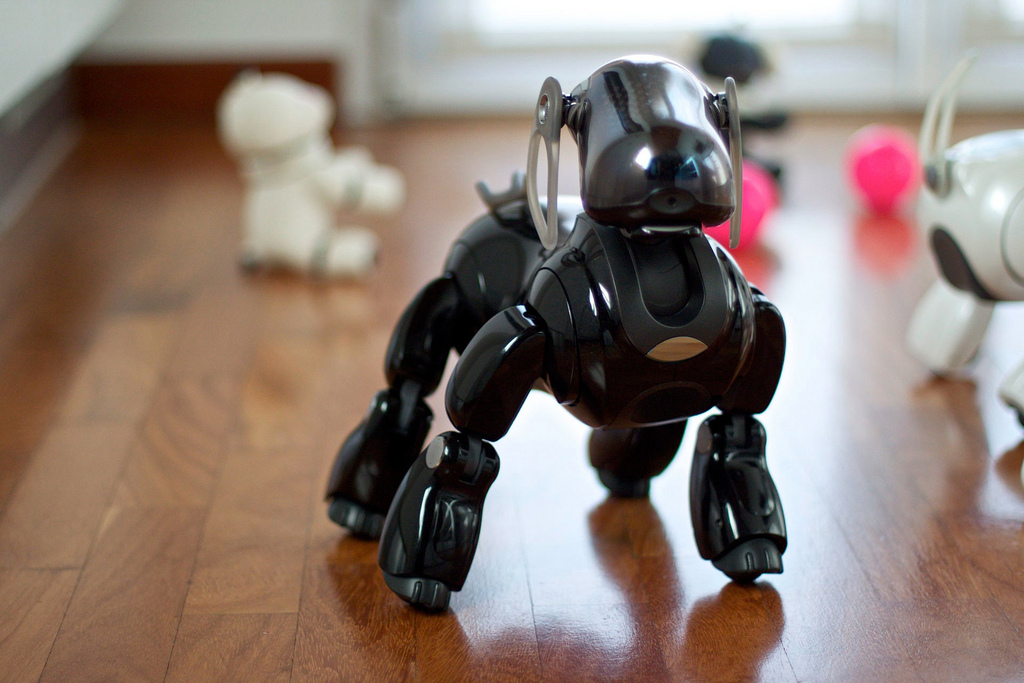Will your pets be robotic in 2050?
Believe it or not, the Tamagotchi can teach us a few things about the future of Fido


A free daily email with the biggest news stories of the day – and the best features from TheWeek.com
You are now subscribed
Your newsletter sign-up was successful
Scores of children spent the mid-1990s raising, neglecting, and ultimately killing a new breed of pet — the egg-shaped Tamagotchi keychain. With three buttons and a pixelated grayscale screen, it wasn't even cute enough to rival the pet rocks of the '70s. But it might have been prophetic.
Despite its rise and fall, the Tamagotchi could have ushered in the start of a robotic pet trend that will only grow in the coming decades, argued University of Melbourne veterinary science researcher Jean-Loup Rault in Frontiers in Veterinary Science. As the world population heads toward 9.6 billion by 2050 and technology advances, robotic pets could serve as an emotionally satisfying substitute for their live counterparts in cramped living quarters, he speculated.
"Are animals what make us humans? Or are we witnessing a leap into what domestication always was: to select animals to be perfect pets, with a need to update the definition of pets as an animal or an artificial device kept for pleasure?" Raul wrote in the May 7 paper.
The Week
Escape your echo chamber. Get the facts behind the news, plus analysis from multiple perspectives.

Sign up for The Week's Free Newsletters
From our morning news briefing to a weekly Good News Newsletter, get the best of The Week delivered directly to your inbox.
From our morning news briefing to a weekly Good News Newsletter, get the best of The Week delivered directly to your inbox.
At first glance it's probably tough to imagine replacing Fido with a robot — but Rault argued it doesn't have to be an either-or situation. An uptick in virtual pet popularity could complement the rising trend of pet ownership globally rather than displace it.
The general idea that humans could derive similar enjoyment from tending to robots as they do furry friends isn't so off-base. In fact, there's evidence to suggest people interact with a robotic animal — say, Sony's Aibo dog — in much the same way they would a live one.
Gail Melson, a Purdue University researcher who focuses on the relationship between animals and child development, has studied Sony's now-discontinued dog extensively. In 2009 she and colleagues published a study suggesting children and adults can foster similar companionships with robots as they do with live pets. They tend to anthropomorphize the robot, ascribing characteristics like life, feelings, and moral values to battery-operated toys.
"I don't think they're meant to fool anyone," Melson said. "I think they're meant to provide some of the fun, the companionship, the stimulation, whatever live animals do, but not supposed to exactly have every aspect of the living animal."
A free daily email with the biggest news stories of the day – and the best features from TheWeek.com
Bill and Marian Banks, then St. Louis University geriatricians, found in a 2006 study that Aibo helped ease nursing home patients' loneliness. It's a sanitary solution for hospitals that can't risk letting animals contaminate the area. And it's also significantly easier for the elderly to reliably care for Aibo. The same idea could be true for some children, like those on the autism spectrum who may not be capable of properly tending to live animals.
Commercially, Aibo might be the best-known robotic pet, but it isn't the only development hinting at an exciting future for the industry. Paro, a Japanese-manufactured robotic seal marketed specifically to hospitals and nursing homes, reportedly encourages dementia patients to form social bonds.
In Japan, where robotic pets mill around nursing homes more extensively than in the states, there were reports of funerals for Aibo dogs after Sony pulled the plug on repairs in 2014. That emotional attachment to a robot doesn't seem so far-fetched to experts.
"Maybe it's not that surprising because people fall in love with their cars and their houses and their boats," Bill Banks said. "Artificial emotion, as opposed to artificial intelligence, is not that difficult to simulate."
While researchers expect robotic technology to advance — potentially rapidly — in the next few decades, it probably won't ever be able to mimic live animals. That's a good thing for owners.
It goes back to the Uncanny Valley, a term roboticist Masahiro Mori coined in 1970. He suggested the human affinity for robots increases as they get more realistic. But then the technology is bound to approach the valley, the point where a robot's likeness to living creatures is enough to make it creepy. Think The Stepford Wives. So robots are bound to get more advanced, but the ideal pet probably isn't a robot designed to be indistinguishable from a living, breathing pooch.
Rault acknowledged that many questions remain for psychologists about the future of robotic pets — just exactly how real manufacturers can make them and how the robots might fall short of satisfying human needs for companionship. Another learning opportunity for researchers would be evaluating what happens chemically in a person's brain when interacting with a robot dog.
The central question, as Rault told The Week, might be: "With all the new movement with technology and mimicking what we get with pets, will it change the way we relate to live animals?"
For now, expect the rise of robotic pets to contain itself mostly in places their human counterparts shouldn't roam: the smallest of apartments, hospitals and nursing homes, households of children with special needs, and among people who simply don't want the responsibility of caring for living creatures. Welcome to 2050, where adorable pets need not have a heart beat.
Julie Kliegman is a freelance writer based in New York. Her work has appeared in BuzzFeed, Vox, Mental Floss, Paste, the Tampa Bay Times and PolitiFact. Her cats can do somersaults.
-
 Political cartoons for February 16
Political cartoons for February 16Cartoons Monday’s political cartoons include President's Day, a valentine from the Epstein files, and more
-
 Regent Hong Kong: a tranquil haven with a prime waterfront spot
Regent Hong Kong: a tranquil haven with a prime waterfront spotThe Week Recommends The trendy hotel recently underwent an extensive two-year revamp
-
 The problem with diagnosing profound autism
The problem with diagnosing profound autismThe Explainer Experts are reconsidering the idea of autism as a spectrum, which could impact diagnoses and policy making for the condition
